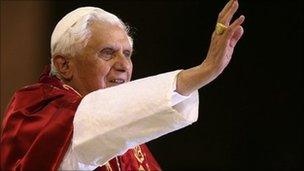Cost of policing the Pope's visit to top £1m
- Published

The Pope is to beatify Cardinal Newman in Birmingham during the visit
The cost of policing the Pope's visit to Britain next week will top £1m.
Meredydd Hughes, of the Association of Chief Police Officers, said there would be no final figure until the four-day visit was over but a "ballpark" estimate was between £1m and £1.5m.
Mr Hughes, who is co-ordinating policing of the visit, said: "We are in the final stages of the planning and are going through various 'what ifs'."
Pope Benedict XVI will visit Edinburgh, Glasgow, London and Birmingham.
It is the first visit by a Pope to the UK since John Paul II in 1982.
Cdr Bob Broadhurst, who is in charge of policing the London end of the visit, said it was impossible to estimate the size of the crowds that would welcome the leader of the world's 1.2 billion Roman Catholics.
"No-one can give us a figure. The only similar event is 1982 and the world is a very different place now. We are gearing up for 'tens of thousands' but we don't know. We know there will be big numbers in Hyde Park but it would be foolish to put a figure on it," he told journalists at a briefing.
Armed bodyguards
Mr Hughes said the Metropolitan Police's specialist public protection unit would be in charge of protecting the Pope during the entire visit and he said armed officers would be deployed.
Asked if the Vatican had requested permission to arm Pope Benedict's bodyguards, Cdr Broadhurst said: "Whenever a foreign leader comes they ask to bring their own armed officers but it's invariably declined. Very occasionally, for example with the US president, one or two people may be given permission."
Mr Hughes, who is Chief Constable of South Yorkshire Police, said the visit posed a unique challenge as it was both a visit by a head of state but also by a religious leader who thousands of people wanted to see.
He said: "We have a duty to ensure the safety of all those inolved, not just the Pope and his entourage, but all those who come to see him and of course the protesters."
Cdr Broadhurst said the main demonstration would be the Protest the Pope rally in London on the Saturday - by an umbrella of organisations opposed to the Catholic Church's teachings and actions on issues such as homosexuality, HIV and sexual abuse by some priests.
He said: "Their own estimate is that 2,000 people will turn up."
'Passion and fervour'
He was asked about fears of a "backlash" by some Catholics against the protesters.
"No doubt there will be the occasional hothead and what we know is that people are very passionate (during papal visits). We do not underestimate the passion and the fervour. We may have to protect the protesters against the faithful," said Cdr Broadhurst.
Assistant Chief Constable Sharon Rowe, from West Midlands Police, spoke about confidential documents about the Pope's visit to Birmingham which had been found in a pub in Leamington Spa by a member of the public.
Ms Rowe said: "They were handed in and reviewed and we are confident that they will not have any impact on policing of the event."
She pointed out the culmination of the visit - the beatification ceremony for Cardinal Newman in Birmingham's Cofton Park - was an all-ticket event and anyone without tickets should steer clear and instead join the crowds in Hagley Road where the Popemobile would pass.
Mr Hughes said the speed of the Popemobile - described as "fast walking pace" - made it vulnerable to egg-throwing and other protests.
He said: "We will have a proportional response to any protest. But once you start throwing eggs you are committing a criminal offence."
Mr Hughes was also asked about a special police unit which monitors "Pope stalkers".
"They usually have mental health issues and we work closely with social services and the NHS," he said.
Naomi Phillips, a spokeswoman for the Protest The Pope group, said: "It seems illegitimate to spend so much money of security for a purely religious activity and spending money on something that over 70% of people don't want to spend money on.
"We want something in return for that money and are asking MPs to raise concerns about the policies of the Holy See."
She said they were encouraging people to lobby their MPs and ask them to press the Pope about the Catholic Church's policies on issues such as gay rights, abortion and the distribution of condoms in Africa.
- Published8 September 2010
- Published18 September 2010
- Published8 September 2010
- Published4 September 2010